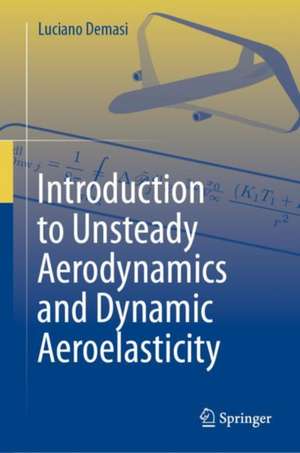Introduction to Unsteady Aerodynamics and Dynamic Aeroelasticity
Autor Luciano Demasien Limba Engleză Hardback – 12 iun 2024
This book introduces the subject of unsteady aerodynamics and dynamic aeroelasticity by presenting industry-standard techniques, such as the Doublet Lattice Method for nonplanar wing systems. “Introduction to Unsteady Aerodynamics and Dynamic Aeroelasticity'' is a useful reference for aerospace engineers and users of NASTRAN and ZAERO but is also an excellent complementary textbook for senior undergraduate and graduate students.
The theoretical material includes:
· Fundamental equations of aerodynamics.
· Concepts of Velocity and Acceleration Potentials.
· Theory of small perturbations.
· Virtual displacements and work, Hamilton's Principle, and Lagrange's Equations.
· Aeroelastic equations expressed in the time, Laplace, and Fourier domains.
· Concept of Generalized Aerodynamic Force Matrix.
· Complete derivation of the nonplanar kernel for unsteady aerodynamic analyses.
· Detailed derivation of the Doublet Lattice Method.
· Linear Time-Invariant systems and stability analysis.
· Rational function approximation for the generalized aerodynamic force matrix.
· Fluid-structure boundary conditions and splining.
· Root locus technique.
· Techniques to find the flutter point: k, k-E, p-k, non-iterative p-k, g, second-order g, GAAM, p, p-L, p-p, and CV methods.
Preț: 624.50 lei
Preț vechi: 734.71 lei
-15% Nou
Puncte Express: 937
Preț estimativ în valută:
119.49€ • 124.76$ • 98.90£
119.49€ • 124.76$ • 98.90£
Carte disponibilă
Livrare economică 14-28 martie
Preluare comenzi: 021 569.72.76
Specificații
ISBN-13: 9783031500534
ISBN-10: 3031500539
Pagini: 831
Ilustrații: XXIII, 831 p. 232 illus., 230 illus. in color.
Dimensiuni: 155 x 235 x 40 mm
Greutate: 1.54 kg
Ediția:2024
Editura: Springer Nature Switzerland
Colecția Springer
Locul publicării:Cham, Switzerland
ISBN-10: 3031500539
Pagini: 831
Ilustrații: XXIII, 831 p. 232 illus., 230 illus. in color.
Dimensiuni: 155 x 235 x 40 mm
Greutate: 1.54 kg
Ediția:2024
Editura: Springer Nature Switzerland
Colecția Springer
Locul publicării:Cham, Switzerland
Cuprins
Finite-Part Integrals.- Convolution and Duhamel Integrals.- Laplace and Fourier Transforms.- Review of the Least Square Method.- Vector Identities Used in Aerodynamics.- Reynolds Transport Theorem, Isentropic, Continuity, and Momentum Equations.- Vorticity, and Kelvin’s Circulation Theorem.- Velocity Potential.- The Biot Savart Law for Incompressible Fluids.- The Fluid-Structure Boundary Condition.- The Aerodynamic Force for the Steady Incompressible Ideal Flow.- Small Perturbation Theory.- Small Perturbation Acceleration Potential.- Compressible Fluid at Rest.- Compressible Fluid in Motion.- Compressible Fluid in Motion: the Doublet Solution.- Theoretical Aerodynamic Modeling of Wings.- Steady Incompressible Ideal Flow and Modeling of Finite Wings .- Two-Dimensional Unsteady Incompressible Flow.- Harmonic Motion, Reduced Frequency, and Kernel.- The Generalized Aerodynamic Force for the Continuous System.- Finite-Element Time Domain Aeroelastic Equations.- Laplace and Fourier Transformed Discrete Aeroelastic Equations.- The Unsteady Kernel.- Industry Standard Doublet Lattice Implementation.- Structural Dynamics: the Concept of Free Vibration Modes.- From the Structural Mesh to the Aerodynamic Mesh: Splining.- Generalized Aerodynamic Force Matrix and Rational Function Approximation.- Equations of Motion in the Laplace Domain with the Use of Rational Function Approximation.- Stability Analysis in the Laplace Domain.- Linear Time-Invariant Systems and Stability.- Linear Time-Invariant Aeroelastic Systems.- Classical Flutter, State Space Model, and Root Locus.- Introduction to the Concept of Body Freedom Flutter.- An Introduction to Nonlinear Aeroelasticity.- An Introduction to Nonlinear Dynamics.
Notă biografică
Dr. Luciano Demasi is Professor of Aerospace Engineering, San Diego State University, San Diego, CA. He received the “Outstanding Contribution to Aerospace Research (2023)” award from the American Institute of Aeronautics and Astronautics (AIAA) and is an AIAA associate fellow.
Luciano Demasi is ranked in top 2% of authors worldwide over a total of 55,422 researchers and published more than 100 articles in the areas of aerodynamics, structures, and aeroelasticity.
Luciano Demasi is ranked in top 2% of authors worldwide over a total of 55,422 researchers and published more than 100 articles in the areas of aerodynamics, structures, and aeroelasticity.
Textul de pe ultima copertă
Aeroelasticity is an essential discipline for the design of airplanes, unmanned systems, and innovative configurations.
This book introduces the subject of unsteady aerodynamics and dynamic aeroelasticity by presenting industry-standard techniques, such as the Doublet Lattice Method for nonplanar wing systems. “Introduction to Unsteady Aerodynamics and Dynamic Aeroelasticity'' is a useful reference for aerospace engineers and users of NASTRAN and ZAERO but is also an excellent complementary textbook for senior undergraduate and graduate students.
Luciano Demasi has written a comprehensive and insightful book on aeroelasticity as practiced today. The careful and deep attention to the fundamentals and a unique and valuable discussion of the implementation of Doublet Lattice aerodynamics are special features of the book. The author also ranges over a number of additional topics including current and promising aircraft and wing concepts that bring new challenges to the aeroelastician.
- Fully develops the theory of acceleration potential, fundamental to the unsteady aerodynamics behind the Doublet Lattice Method;
- Explains fully the industry-standard unsteady aerodynamics capability: the Doublet Lattice Method;
- Theoretically develops various state-of-the-art methods to determine the flutter point;
- Clarifies the differences between ``cantilever flutter’’ and ``body freedom flutter’’;
- Introduces the nonlinear aeroelasticity of Joined Wings and innovative wing systems.
The student new to the topic as well as the experienced practitioner will find much to ponder and benefit from a careful reading of this text.
— Prof. Earl Dowell, Duke University
Caracteristici
Fully develops the theory of acceleration potential, fundamental to the unsteady aerodynamics Explains fully the industry-standard unsteady aerodynamics capability: the Doublet Lattice Method Theoretically develops various state-of-the-art methods to determine the flutter point
